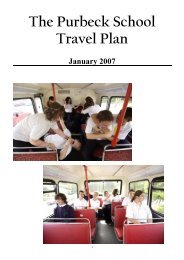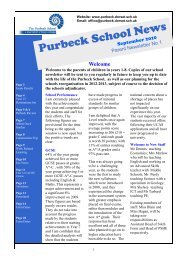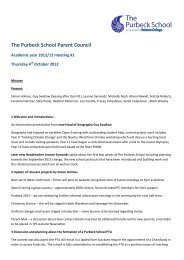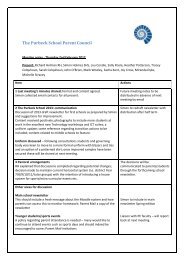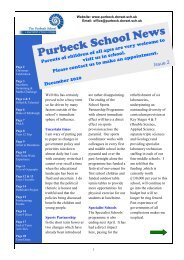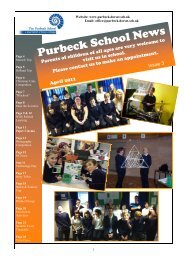Sixth Form Course Guide 2013-14 - The Purbeck School
Sixth Form Course Guide 2013-14 - The Purbeck School
Sixth Form Course Guide 2013-14 - The Purbeck School
Create successful ePaper yourself
Turn your PDF publications into a flip-book with our unique Google optimized e-Paper software.
Why study this subject?<br />
• Because it’s AWESOME.<br />
History<br />
• Because you learn about countries, societies and cultures - so many of today's<br />
conflicts and issues have their roots in the past; how can you negotiate with, trade<br />
successfully with, or report on a country if you know nothing of its history?<br />
• Because you learn to locate and sift facts - to identify truth and recognise myth,<br />
propaganda and downright lies (useful in every aspect of life!).<br />
• Because you learn about people - how they interact, the motives and emotions that can tear people apart<br />
into rival factions or help them to work together for a common cause (useful knowledge for team-building at<br />
work!).<br />
• Because you learn to present what you've learned in a way that makes sense to others - whether in<br />
presentations, essays or reports - and gain the confidence to defend your findings.<br />
Summary of course content<br />
Unit 1 – How are countries created? - <strong>The</strong> unification of Italy and Germany 1848-71. Assessed in an exam which<br />
challenges you to explain change and development through sharply focused essays.<br />
Unit 2 – Why doesn’t Britain have an Empire anymore? Britain and India 1900-47. Assessed in an exam based<br />
around reading and grasping examples of historical viewpoints and attitudes.<br />
Unit 3 – How popular was Hitler? How and why were evil things done by German people? Germany 1900-1945.<br />
Assessed in a final exam which challenges students to compare and contrast differing historical perspectives about<br />
the course of German History; historiography.<br />
Unit 4 – How and why did Russia become a modern state? Russia c1854-c1964. Assessed through two extended<br />
pieces of coursework, focusing upon the turning point through which Russia was modernised, and the role of key<br />
individuals.<br />
Where the course leads<br />
A Level History is recognised by the Admissions Offices of Universities and other Higher Education establishments as<br />
a rigorously challenging course. Whether or not you choose to study History at degree level, your ‘A’ Level in History<br />
will demonstrate that you are a strongly academic student. Your ‘A’ Level in History will be a useful and welcome<br />
asset in any kind of career where you need to handle and process information, and make decisions and judgements<br />
based upon that information … clerical, legal, educational, public service, business, military, marketing, etc.<br />
Examples of jobs and career areas where the study of ‘A’ Level History is an asset; Librarian, Public relations,<br />
Advertising and Marketing, Army officer, Journalist, Primary school teacher, Barrister, Accountant, Solicitor, Manager<br />
in commerce/ industry, Civil servant, Banker, Police detective.<br />
Examples of jobs directly related to Historical knowledge and skills; Teacher of history in a school or FE college,<br />
Lecturer in History in higher education, Archivist, Museum or gallery curator, Writer of history books or articles,<br />
Librarian specialising in history.<br />
Entry requirements: Students will need to be eligible to follow the route A Pathway. If you have not studied GCSE<br />
History, but are an appropriately academic and committed student, we are happy to discuss the possibility of you<br />
studying A Level History.<br />
Exam board and syllabus: Edexcel Syllabus A<br />
For further advice contact: Mr Rainsley and Mr Deremaux



